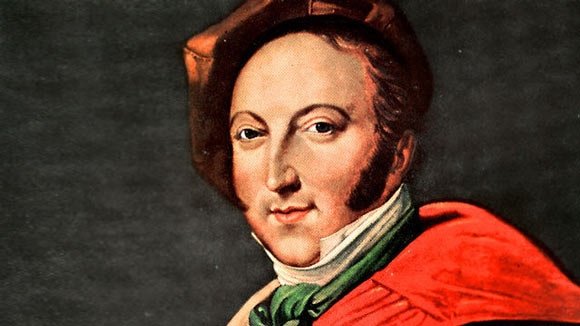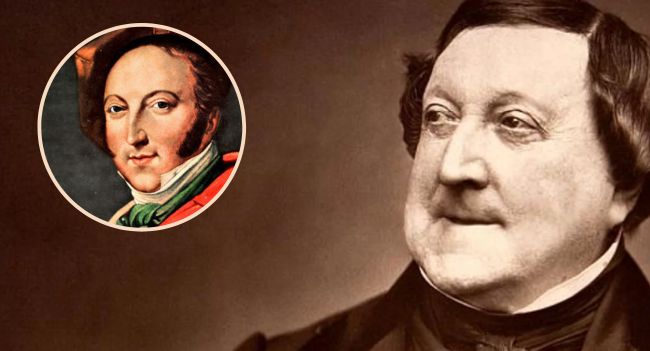Gioacchino Rossini was born in Pesaro on the 29 th of February 1792, three months after Mozart. Just like him, he was extremely talented already at a young age, an opera’s young genius. He started composing at the age of 14 and he wrote 39 operas in just 19 years. Among them we could mention: The Barber of Seville, The Italian Girl in Algiers, The Thieving Magpie, Cinderella, The Turk in Italy, Semiramide and William Tell.
Gioacchino Rossini was a man with a multi-faceted personality. He has been described as a man with a terrible temper, prone to depression, angry and hypochondriac, and he loved good food, women and the good life. Just like many other geniuses before him, he was a man with a complex spirit, which will often bring him to suffer from depressive crisis.
Rossini’s style is characterized by a unique bright rhythm, almost frenetic. This differentiates him from the other authors of the VIII century, who have in common with him only some stylistic features and formal conventions. The “Rossinian crescendo” makes his music perfect for comic operas, but it is also a good fit for dramas. His operas are usually divided in two acts: the first is longer and more complex, while the second is shorter and lighter.
In more modern times, there has been a Rossinian Renaissance, which refers especially to the period around the 70s when many Rossini’s operas were rediscovered by Philip Gosset, Alberto Zedda and many others. However, even in the 40s Vittorio Gui started to perform the less known operas by Rossini or the ones that had been forgotten. The opera resurrected by the interpretation of Maria Callas is still today performed all over the world.
Moreover, Rossini is still celebrated today with the annual Rossini Opera Festival in Pesaro.
Rossini was an exceptional artist, an innovator and a symbol for the lyric opera. Mazzini defines him as a “titan of power and audacity” and because of his early talent and rapid composition skills he has been called “the Italian Mozart”. Rossini abandoned suddenly his career in 1829 and he retired to private life in the countryside of Passy, where he died in 1868.
Gioachino Rossini was born in a family of musicians in Pesaro on February 29, 1792. His father, Giuseppe, was an inspector in slaughterhouse while his mother, Anna, was a notable singer. He had already begun his musical career in his early childhood. By the age of six, he was already playing the triangle in his father’s musical group. At the age of 14 he entered Bologna’s Philharmonic School and composed his first opera seria—Demetrio e Polibio. At 15, he could already play number of instrument and had made some public appearances to earn reasonable fortune.

In 1799, Rossini’s father was sent to prison for one year on supporting French revolution. His mother then took him to Bologna where she earned her fortunes by singing for various theaters. There he played harpsichord under Giuseppe Prinetti directions for the next three years, who was a musician as well as owned a business of selling beer. Later he started working for blacksmith named Angelo Tessie, under whose coaching he learnt to play piano and made his first public appearance. In 1805, at the theatre of the Commune in Ferdinando Paer’s Camilla, he made his first official public appearance as a singer. In 1806, he became cello student and was admitted to counterpoint class of Padre Stanislao Mattei and learned to play cello with ease but the academic asperity of Mattei’s views on counterpoint served only to drive the young composer’s views toward a freer school of composition.
He produced his first opera, La cambiale di matrimonio, when he was only 18 years old. In 1813, the young composer gained international fame for producing Tancredi and L’italiana. He established himself as graven image of Italian opera. He continued to write operas for Venice and Milan during the next few years but never received the response he expected. In 1815, he retired to his home in Bologna and started working for Domenico Barbaia to compose one opera per year for 200 ducats per month.
The Barber of Seville was Rossini’s greatest accomplishment. Rossini’s Barber is one of the greatest masterpieces of comedy within music. He produced 20 operas between 1815 and 1823. In 1822, he went to Vienna and performed many operas in German. In the same year, he then married the famous singer Isabella Colbran, who starred in many of his operas. When he stopped receiving appreciation from the local audiences he stop writing for his native country and moved to England where he was royally welcomed and received good fortunes for his performances. He then worked for the Theater Italian as musical director and wrote his last two operas Le Comte Ory and Guillaume Tell.
In 1845, after Isabella death, Rossini married Olympe Pélissier. In 1846, he modified some of his old operas for the newly appointed Pope, Pius IX. Sadly his health continued to decline and he was later diagnosed with cancer in 1868. He then went through two surgeries and was expected to return to his full health but he could never fully regain his health. He died on November 13, 1868 in Passy and was buried in Paris. Thousands of mourners attended his funeral. Later at Olympe’s request, his remains were relocated to Florence.
Some of the major and most accomplished work of Gioachino Rossini includes William Tell, Thieving Magpie, The Barber of Seville, The Italian Girl in Algiers and The lady of the lake.
